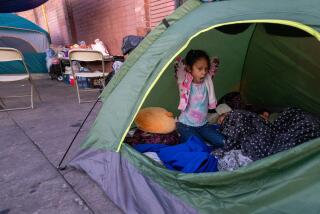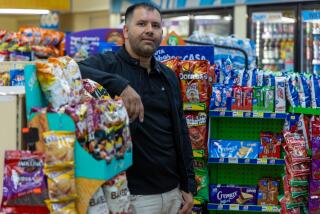28 Is Enough: Missionary Couple Need Huge Home for Brood
- Share via
GREENSBURG, Ind. — Kathy Blackburn perched on a stool, bullhorn in hand, reciting the Lord’s Prayer before 28 bowed heads.
A burst of giggles erupted, but the mother of this brood--17 boys and 11 girls--was a picture of tolerance.
“I hear kids from the time I wake up until the time I go to sleep,” she said. Then she added: “There are times I’ve been frantic.”
Blackburn, 42, and her husband, Dan, 45, came home to Indiana at the end of 1989. The two missionaries and their wards--all orphaned or abandoned Haitians, ages 3 to 14--are temporarily living in a drafty church camp about 50 miles southeast of Indianapolis.
The Blackburns, who have two grown children of their own, began taking in homeless children shortly after they began missionary work in 1969. At one time they thought about opening an orphanage. Now they plan to adopt all the children, four of whom are retarded.
In 1987, unrest in Haiti forced the couple to flee to the Dominican Republic. Last December, they finally received permission from the U.S. Immigration and Naturalization Service to bring the children to the United States.
The children are Rosie and Mary, both 14; Becky, Yvonne and Jim, 12; Tom, Sam, Bobby, Cheryl and Jo Anna, 11; Steve, Marva and Liz, 10; Jemima, Abigail, Aaron, Jeremiah, Benji, Noah and Gideon, 9; Matthew and Jake, 8; Rachael, 7; Thaddeus, 6; Mike and Caleb, 4, and Andy and Mark, 3.
In Haiti, the family had a house. In Indiana, they sleep in a dormitory heated by a wood stove and use an outdoor privy.
Down the lane is the “chow house,” the hub of the family’s social life. A hand-made sign posted on the refrigerator reads:
“A late meal is a hardship with 28 kids. Please have consideration for the cook. Thanks.”
Dan Blackburn does the cooking and minds the older boys, who wash dishes and sweep the floors. The girls do the laundry and take care of the younger children.
Kathy Blackburn said that the secret to managing 28 children and a household is not to fear mistakes.
Parenthood is “something you can’t cram for at the last minute,” she said. “We do it by making mistakes, by trial and error. It’s just something you keep working at.”
The Blackburns have many of the same dreams that others hold for their children.
“I’d like them to have music lessons, learn to ride a bike, know history and know it well, and be well-educated within their own bounds,” Kathy Blackburn said.
The children are taught by the Blackburns and volunteer teachers who come to the camp to give lessons in math, science, reading, writing and sign language--the last a device to keep down the noise level at home.
“These kids aren’t overstimulated,” Kathy Blackburn said. “They enjoy stuff. . . . A jet going over or a beautiful sunset is a really big deal. They not only appreciate, but they comment on it.”
Rosie recently went with Dan Blackburn to a department store, where she took her first elevator ride.
“It’s continual questions. Even getting into a car is a big deal for them,” he said.
As part of their arrangement with immigration authorities, the Blackburns may not accept welfare. They rely on regular donations from about 20 churches and whatever other help comes in. Local merchants have given them second-hand clothing and day-old baked goods. The family has received clothes, food, toys and money from strangers who have heard about them in news reports.
“We’re not taking a vow of poverty, but one of the things I want to discourage is excess--the mind-set that you don’t need one thing, you need 10,” Kathy Blackburn said.
The family’s most pressing need is for a permanent home. They must leave the church camp before the season opens May 1. The Rev. Lee Creech, who has supported the Blackburns’ missionary work for 20 years, heads a committee that is working to find them housing.
“More people are in awe than anything else that someone would attempt to do this,” said Creech, pastor at New Bethel United Methodist church in Decatur County. “I think it’s the best way for someone else to say, ‘I am my brother’s keeper.’ ”
More to Read
Sign up for Essential California
The most important California stories and recommendations in your inbox every morning.
You may occasionally receive promotional content from the Los Angeles Times.













